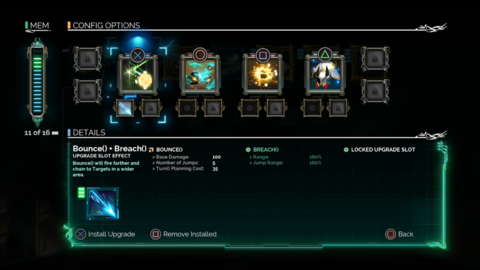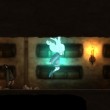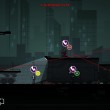Transistor Review
A dead man. A weapon. A dress, torn and discarded on the ground. A voice says, "What a night. You're still in one piece; that's all that matters."
Transistor begins with remarkable confidence, throwing you right into the life of nightclub singer Red at what might be her lowest point. There's no immediate explanation for who she is, or what this world is, or what happened the night before, and all this mystery only makes your journey more captivating. Transistor asks you to trust in it, to come along on the journey even though you have no idea where you're going. And it rewards your trust, weaving a beautiful and unconventional sci-fi tale with a human heart, and empowering you with a wonderfully flexible combat system that fuses real-time and turn-based action to create something that feels unique.
As you move through Cloudbank, the world of Transistor, you encounter manifestations of the process, a force that's seemingly running rampant, annihilating Cloudbank as it goes. With the help of the transistor--the strange weapon you pull from a dead man's body when the game begins, a weapon Red drags along behind her as if it's a sword that's too heavy for her to wield properly--you fight the process. You can run around fighting your enemies in real time, but you're outnumbered, and you're just not quick enough or strong enough to overcome them this way. Thankfully, you have a trick up your sleeve called turn, which enables you to freeze time, plot out your upcoming movements and attacks, and then carry them out in rapid succession.
As you progress, you collect more and more techniques, called functions, each one the essence of a fallen resident of Cloudbank. There are 16 functions in all, including straightforward attacks, movement abilities, a function that spawns a doglike helper, a function that temporarily turns enemies into allies, and others. Each one can be slotted as an active ability, or to upgrade another function, or to give you a passive benefit. There are a remarkable variety of ways in which these techniques can be combined, and hitting on particularly effective combinations and putting them to use in battle is immensely satisfying.
Transistor's combat makes you feel powerful by giving you an edge on the process, but it also encourages you to think carefully about what you're doing, because the process is no pushover. It has tricks of its own, sometimes obscuring your vision, sometimes pulling you out of your turning phase without warning. It's a clever foe, which makes matching wits with it all the more enjoyable. And, much like the idols of Supergiant Games' earlier game Bastion, Transistor has limiters, optional modifiers that make your life more difficult but reward you with more experience, so if you want a more challenging experience, you can have it.
But what is the process, really? And what has happened to all the residents of Cloudbank? Red is driven to get to the bottom of it, and she's not alone. From inside the transistor speaks a man's voice, bringing life to your quest as it responds to your actions and slowly helps you piece together the story of Cloudbank. The always-present voice also puts a relationship at the heart of Transistor. Red can't speak--the events of the night before have stripped her of her voice--but her wordless actions reveal her fierce determination, and as the voice speaks from the transistor, and Red finds ways of responding to it, a connection between the two becomes clear.
There's a touch of magic, even of spirituality, to Transistor's story, a sense that there are things within the world of Cloudbank that transcend our understanding of what's possible.
Also shedding light on the world and its people are the files accompanying each function. To reveal more about these people whose essence has been trapped in the transistor, you have to use their functions in different ways, putting them in active slots, upgrade slots, and passive slots, which gives you an incentive to tweak your build and try different techniques. The files are so well written and paint such vivid pictures of Cloudbank's fallen residents that you naturally want to uncover all the details they contain.

What slowly emerges in Transistor is the story of a clandestine organization called the Camerata, working behind the scenes in Cloudbank for its own purposes. And while the answers to the plot's questions about who the Camerata are and what the transistor does are interesting, they're not what makes Transistor's story special. Cloudbank is a technological world, but not a cold one. It's not a place of pure ones and zeroes. There's a touch of magic, even of spirituality, to Transistor's story, a sense that there are things within the world of Cloudbank that transcend our understanding of what's possible.
And Transistor's artful presentation has some magic of its own. There are a few astounding moments in Transistor, like the moment when you step up to a microphone and press a button to sing, and Red's haunting voice comes in and carries you back to what had happened the night before, the visuals communicating in shorthand what words would take too much time to say. Or the moment when Red, silhouetted against the city, speeds across Cloudbank on a motorcycle, hunting the people who are responsible for everything that has happened.
Transistor is always a good-looking game, but in these instances, it demonstrates a rare knack for combining its visuals and music to powerfully convey both narrative information and tone, driving the story forward with Red's own unwavering resolve. So in the end, yes, Transistor is a fun action role-playing game with a neat combat system, but beautiful moments like these make it more than that. They make it a game with a soul.









